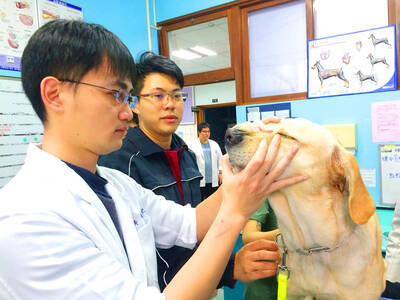A group that works to promote the welfare of Alzheimer’s disease sufferers yesterday urged the government to subsidize global positioning system (GPS) tracking devices for individuals suffering from the disorder that causes dementia.
The Taiwan Alzheimer’s Disease Association said equipping sufferers with the device would prevent them from wandering the streets and enable family members to find them easily.
“A GPS locator is just too expensive for an average family to afford,” said Tang Li-yu (湯麗玉), secretary-general of the association.
The service would likely include a NT$6,000 (US$188) cellphone-like tracking device with a monthly maintenance fee of NT$600, according to a local provider.
Tang’s organization has been lobbying the Ministry of the Interior to share the cost with patients’ families for years, but to no avail.
However, Tang admits that even though the GPS device would be handy, there are cheaper alternatives to helping dementia patients find their way home.
Cheaper methods include having patients’ fingerprints taken at a police station, patients wearing bracelets with their home address or a family member’s contact details on it, stitching names on personal belongings and putting name cards in bags.
In case people encounter confused or lost elderly people in the street, these provide useful ways for them to identify sufferers so they can help them find their way home, Tang said.
“The best bet would be to apply all of the means above to ensure efficiency,” she said.
As of the end of last year, there were 35,783 reported cases of dementia in Taiwan, most of them people 65 years or older. Numbers continue to increase steadily, according to government statistics.
“As much as we would like to have senior patients use GPS, it’s just too costly,” said Yu Fang-ling (俞芳苓), a public relations officer at Saint Mary’s Hospital in Luodong (羅東).
Yu’s hospital received 20 free GPS devices from Taiwan Secom Company, a local provider, several years ago and has been distributing and redistributing them to elders living alone and those with chronic ailments.
However, the company’s spokesman, Max Chu, said the market for elderly people using GPS devices is not as large as the company had expected.
Well-off families prefer to hire a caregiver to follow their loved ones around, whereas other families may keep dementia patients at home at all times, he said.
There are only about 3,000 clients, including children and the elderly, using a GPS locator in Taiwan, he added.

Former Czech Republic-based Taiwanese researcher Cheng Yu-chin (鄭宇欽) has been sentenced to seven years in prison on espionage-related charges, China’s Ministry of State Security announced yesterday. China said Cheng was a spy for Taiwan who “masqueraded as a professor” and that he was previously an assistant to former Cabinet secretary-general Cho Jung-tai (卓榮泰). President-elect William Lai (賴清德) on Wednesday last week announced Cho would be his premier when Lai is inaugurated next month. Today is China’s “National Security Education Day.” The Chinese ministry yesterday released a video online showing arrests over the past 10 years of people alleged to be

THE HAWAII FACTOR: While a 1965 opinion said an attack on Hawaii would not trigger Article 5, the text of the treaty suggests the state is covered, the report says NATO could be drawn into a conflict in the Taiwan Strait if Chinese forces attacked the US mainland or Hawaii, a NATO Defense College report published on Monday says. The report, written by James Lee, an assistant research fellow at Academia Sinica’s Institute of European and American Studies, states that under certain conditions a Taiwan contingency could trigger Article 5 of NATO, under which an attack against any member of the alliance is considered an attack against all members, necessitating a response. Article 6 of the North Atlantic Treaty specifies that an armed attack in the territory of any member in Europe,

LIKE FAMILY: People now treat dogs and cats as family members. They receive the same medical treatments and tests as humans do, a veterinary association official said The number of pet dogs and cats in Taiwan has officially outnumbered the number of human newborns last year, data from the Ministry of Agriculture’s pet registration information system showed. As of last year, Taiwan had 94,544 registered pet dogs and 137,652 pet cats, the data showed. By contrast, 135,571 babies were born last year. Demand for medical care for pet animals has also risen. As of Feb. 29, there were 5,773 veterinarians in Taiwan, 3,993 of whom were for pet animals, statistics from the Animal and Plant Health Inspection Agency showed. In 2022, the nation had 3,077 pediatricians. As of last

XINJIANG: Officials are conducting a report into amending an existing law or to enact a special law to prohibit goods using forced labor Taiwan is mulling an amendment prohibiting the importation of goods using forced labor, similar to the Uyghur Forced Labor Prevention Act (UFLPA) passed by the US Congress in 2021 that imposed limits on goods produced using forced labor in China’s Xinjiang region. A government official who wished to remain anonymous said yesterday that as the US customs law explicitly prohibits the importation of goods made using forced labor, in 2021 it passed the specialized UFLPA to limit the importation of cotton and other goods from China’s Xinjiang Uyghur region. Taiwan does not have the legal basis to prohibit the importation of goods